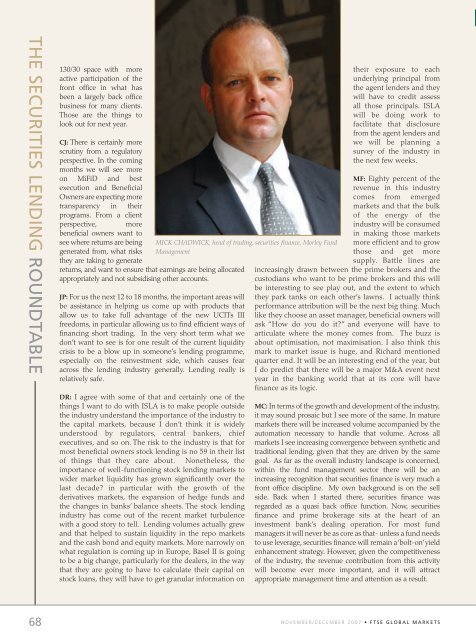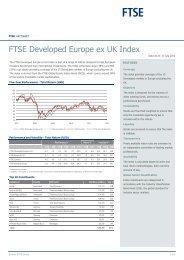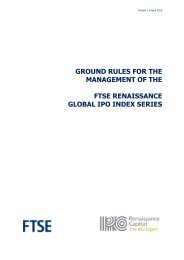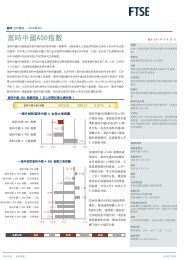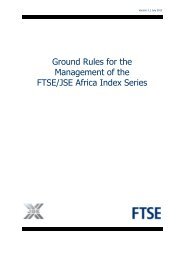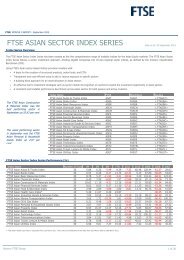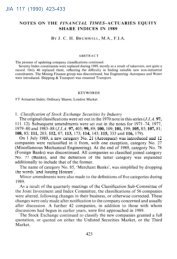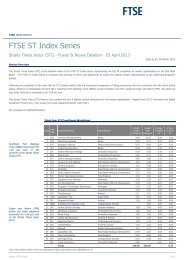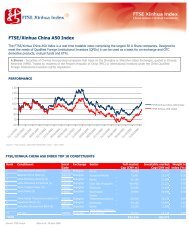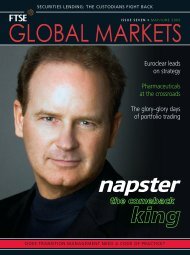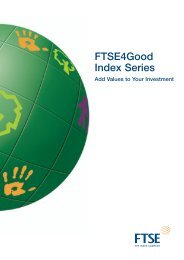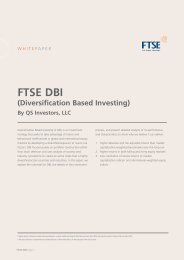Section 2 - FTSE
Section 2 - FTSE
Section 2 - FTSE
You also want an ePaper? Increase the reach of your titles
YUMPU automatically turns print PDFs into web optimized ePapers that Google loves.
THE SECURITIES LENDING ROUNDTABLE<br />
68<br />
130/30 space with more<br />
active participation of the<br />
front office in what has<br />
been a largely back office<br />
business for many clients.<br />
Those are the things to<br />
look out for next year.<br />
CJ: There is certainly more<br />
scrutiny from a regulatory<br />
perspective. In the coming<br />
months we will see more<br />
on MiFiD and best<br />
execution and Beneficial<br />
Owners are expecting more<br />
transparency in their<br />
programs. From a client<br />
perspective, more<br />
beneficial owners want to<br />
see where returns are being<br />
generated from, what risks<br />
they are taking to generate<br />
returns, and want to ensure that earnings are being allocated<br />
appropriately and not subsidising other accounts.<br />
MICK CHADWICK, head of trading, securities finance, Morley Fund<br />
Management<br />
JP: For us the next 12 to 18 months, the important areas will<br />
be assistance in helping us come up with products that<br />
allow us to take full advantage of the new UCITs III<br />
freedoms, in particular allowing us to find efficient ways of<br />
financing short trading. In the very short term what we<br />
don’t want to see is for one result of the current liquidity<br />
crisis to be a blow up in someone’s lending programme,<br />
especially on the reinvestment side, which causes fear<br />
across the lending industry generally. Lending really is<br />
relatively safe.<br />
DR: I agree with some of that and certainly one of the<br />
things I want to do with ISLA is to make people outside<br />
the industry understand the importance of the industry to<br />
the capital markets, because I don’t think it is widely<br />
understood by regulators, central bankers, chief<br />
executives, and so on. The risk to the industry is that for<br />
most beneficial owners stock lending is no 59 in their list<br />
of things that they care about. Nonetheless, the<br />
importance of well-functioning stock lending markets to<br />
wider market liquidity has grown significantly over the<br />
last decade? in particular with the growth of the<br />
derivatives markets, the expansion of hedge funds and<br />
the changes in banks’ balance sheets. The stock lending<br />
industry has come out of the recent market turbulence<br />
with a good story to tell. Lending volumes actually grew<br />
and that helped to sustain liquidity in the repo markets<br />
and the cash bond and equity markets. More narrowly on<br />
what regulation is coming up in Europe, Basel II is going<br />
to be a big change, particularly for the dealers, in the way<br />
that they are going to have to calculate their capital on<br />
stock loans, they will have to get granular information on<br />
their exposure to each<br />
underlying principal from<br />
the agent lenders and they<br />
will have to credit assess<br />
all those principals. ISLA<br />
will be doing work to<br />
facilitate that disclosure<br />
from the agent lenders and<br />
we will be planning a<br />
survey of the industry in<br />
the next few weeks.<br />
MF: Eighty percent of the<br />
revenue in this industry<br />
comes from emerged<br />
markets and that the bulk<br />
of the energy of the<br />
industry will be consumed<br />
in making those markets<br />
more efficient and to grow<br />
those and get more<br />
supply. Battle lines are<br />
increasingly drawn between the prime brokers and the<br />
custodians who want to be prime brokers and this will<br />
be interesting to see play out, and the extent to which<br />
they park tanks on each other’s lawns. I actually think<br />
performance attribution will be the next big thing. Much<br />
like they choose an asset manager, beneficial owners will<br />
ask “How do you do it?” and everyone will have to<br />
articulate where the money comes from. The buzz is<br />
about optimisation, not maximisation. I also think this<br />
mark to market issue is huge, and Richard mentioned<br />
quarter end. It will be an interesting end of the year, but<br />
I do predict that there will be a major M&A event next<br />
year in the banking world that at its core will have<br />
finance as its logic.<br />
MC: In terms of the growth and development of the industry,<br />
it may sound prosaic but I see more of the same. In mature<br />
markets there will be increased volume accompanied by the<br />
automation necessary to handle that volume. Across all<br />
markets I see increasing convergence between synthetic and<br />
traditional lending, given that they are driven by the same<br />
goal. As far as the overall industry landscape is concerned,<br />
within the fund management sector there will be an<br />
increasing recognition that securities finance is very much a<br />
front office discipline. My own background is on the sell<br />
side. Back when I started there, securities finance was<br />
regarded as a quasi back office function. Now, securities<br />
finance and prime brokerage sits at the heart of an<br />
investment bank’s dealing operation. For most fund<br />
managers it will never be as core as that- unless a fund needs<br />
to use leverage, securities finance will remain a ‘bolt-on’yield<br />
enhancement strategy. However, given the competitiveness<br />
of the industry, the revenue contribution from this activity<br />
will become ever more important, and it will attract<br />
appropriate management time and attention as a result.<br />
NOVEMBER/DECEMBER 2007 • <strong>FTSE</strong> GLOBAL MARKETS


